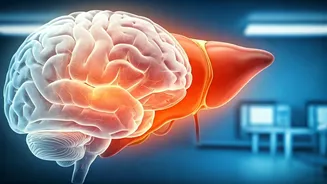Mind-Body Connection Examined
The human body operates through complex systems, with a significant link between physical and mental health. While often considered separate, metabolic
processes have a profound influence on mental states. These metabolic functions are involved in regulating mood, focus, and cognitive abilities. When metabolic disorders arise, they can trigger or exacerbate mental health challenges. It's crucial to acknowledge this connection, as it highlights the importance of overall well-being. Recognizing the influence that metabolism has on our mental state can allow us to take proactive measures. This preventative approach may include lifestyle changes and other interventions that positively impact the mind and the body. Paying close attention to the mind-body relationship can lead to improvements in both physical and mental well-being.
Early Detection Matters
Early detection is paramount in addressing the impact of metabolic disorders on mental health. Identifying these issues early on can significantly improve outcomes. Early diagnosis enables timely intervention, which may prevent the progression of mental health issues and improve overall well-being. Ignoring early signs can worsen symptoms, making recovery more challenging. Therefore, heightened awareness and regular check-ups are essential. This approach is beneficial for both adults and children, as early detection allows for a more comprehensive treatment plan. Such plans may involve lifestyle adjustments, medication, or therapy. Prioritizing early detection serves as a vital first step in managing and mitigating the effects of metabolic disorders on mental health. Remember that taking proactive measures will ultimately promote both physical and mental well-being.
Metabolism’s Mental Influence
Metabolic processes play a significant role in influencing various aspects of mental health. These processes directly affect mood, focus, and memory. Disruption to metabolic function, often caused by disorders, can lead to mood swings, cognitive impairment, and other mental health challenges. Many people are unaware of this crucial link, making the issue more difficult to address. However, by understanding these hidden connections, individuals can take proactive steps. For example, adopting a healthier lifestyle and seeking appropriate medical guidance can help in safeguarding mental health. The intricate interplay between metabolic health and mental well-being reinforces the need for a holistic approach. Addressing both physical and mental health simultaneously is crucial for achieving an optimum state of health. It highlights the importance of preventive measures and comprehensive care.
Lifestyle as Prevention
Adopting a lifestyle focused on prevention is a powerful tool in safeguarding mental health. Simple changes can significantly improve both physical and mental well-being. Regular physical activity, a balanced diet, and sufficient sleep are essential foundations for good health. These habits directly influence metabolic function, which in turn benefits mental health. Creating a healthy environment in your life involves minimizing stress and promoting emotional well-being. This can be achieved through techniques such as mindfulness and social connections. Furthermore, being mindful of mental health and having an open line of communication is also very important. Taking care of your body through healthy habits and seeking mental health support strengthens the mind-body connection, and this empowers you to prevent potential issues and promotes overall wellness. Making such lifestyle adjustments creates a foundation for both a healthier body and a healthier mind.
Awareness and Action
Awareness is the first step in addressing the link between metabolism and mental health. Understanding the potential impact of metabolic disorders on mental well-being encourages people to take action. This awareness extends to recognizing early warning signs and seeking professional help when needed. Regular check-ups and open communication with healthcare providers are essential parts of this process. Educational resources and support networks also play a crucial role in empowering individuals. By actively seeking knowledge and support, individuals can take control of their health. This proactive approach encourages people to make informed decisions about their well-being. Remember, being aware enables informed decisions, and this is crucial to successfully managing this complex relationship. Prioritizing awareness and taking action creates opportunities to strengthen both physical and mental health.













